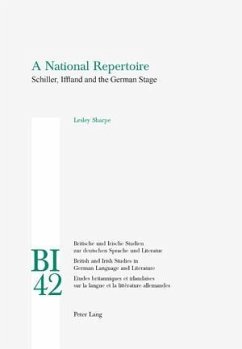Friedrich Schiller had a difficult relationship with the theatre world and wrote plays that, though successful on stage, ran counter to contemporary trends. This study sets Schiller in the context of the theatre history of his period by examining the impact on his dramatic production of the circumstances of the two theatres with which he was closely involved, the Mannheim National Theatre and the Weimar Court Theatre, where Goethe was Director. Born in the same year as Schiller, August Wilhelm Iffland was the most prominent actor of his generation and a prolific playwright, whose early career at the Mannheim theatre made him Schiller's rival. Yet later, as Director of the Berlin National Theatre, Iffland helped create a national repertoire with Schiller's dramas as its cornerstone. By analysing the theatrical careers of Schiller and Iffland in parallel, this study explores the developing belief in theatre as a cultural institution. It also illuminates the relationship between Schiller and Goethe as theatre practitioners.
Bitte wählen Sie Ihr Anliegen aus.
Rechnungen
Retourenschein anfordern
Bestellstatus
Storno








